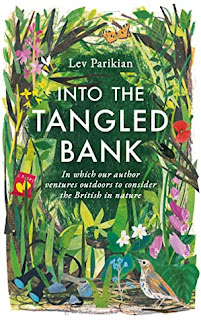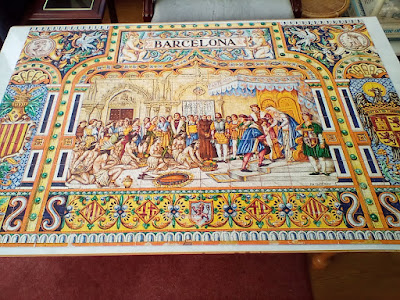From time to time the British Library send me these wonderful collections of weird short stories for review and I feel so grateful as they're always enjoyable and fun and I get such a thrill when a new one arrives. This one is Dangerous Dimensions: Mind Bending Tales of the Mathematical Weird edited by Henry Bartholomew.
This is a collection of 12 stories written by 11 different authors. From the blurb on the cover:
'... early weird fiction probes the very boundaries of reality - the laws and limits of time, space and matter.
Now I don't claim to understand this sort of thing, I suppose it's the territory of physicists and mathematicians and those in possession of far more brain cells than me. So this collection was a bit of a challenge for me in places but hey-ho, I'm nothing if not a Game Old Bird.
So these are the stories in this anthology:
1. The Plattner Story - H.G. Wells. I do love a good Wells short story and this one tells of a man whose organs are on the opposite side of his body to that which they should be. He wasn't born like that so how did that happen? Beautifully written as you would expect and reminds me that I really must get around to a reread of The War of the Worlds.
2. The Hall Bedroom - Mary Eleanor Wilkins Freeman. A woman in reduced circumstances takes in boarders in order to make a living. She puts one of them in the hall bedroom and what happens when he wakes in the middle of the night and finds his room is much bigger than it should be is the basis of this story. Good one. I've got a whole volume of this author's work from the British Library publishers and look forward to reading it.
3. Space - John Buchan. Not an author one normally associates with weird fiction but this story that asks the question, 'What if the space all around us is full of things we cannot see'? illustrates that no matter which genre an author generally belongs to he or she is usually quite capable of writing something else entirely. This was quite creepy and really rather good.
4. A Victim of Higher Space - Algernon Blackwood. This is a John Silence story, Blackwood's psychic detective, and recounts the story of a man trapped in the 4th. dimension and how Silence tries to save him.
5. The Pikestaffe Case - Algernon Blackwood. Miss Speke, an ex-governess, takes in lodgers. One of the men she takes in is a higher mathematician and she thinks he will fit nicely with the clergyman and bank official she already has staying. (We all can guess where this is going.) Said mathematician takes a dislike to a full length mirror in the room, constantly turning it to the wall. He orders all kinds of books and large amounts of supplies but when she checks his room Miss Speke can find no sign of them. Slowly the new lodger starts to fill her with dread... This was one of my favourite stories in the book. Blackwood is so good at creating menacing atmospheres and I've long been a big fan of his writing.
6. The Hounds of Tindalos - Frank Belknap Long. This is apparently one of the first Cthulhu Mythos stories 'not' written by H.P. Lovecraft and tells of a mystic/ascetic type who takes a new drug that he thinks will take him back in time. But how far?
7. The Trap - H.P. Lovecraft and Henry Whitehead. This is another 'old mirror' story (who doesn't love one of those?) A teacher in a boy's school has one and an inquisitive boy touches it with his finger and the finger is pulled in and disappears. Naturally, said boy can't resist coming back on the quiet... Very good yarn.
8. The Living Equation - Nat Schachner. A (mad) scientist builds a machine intended to create new mathematical equations. Naturally a burglar breaks in and inadvertantly sets it off. I liked the idea of this one but found it a bit over complicated to read.
9. Infinity Zero - Donald Wandrei. This 'end of the world' type story has a world war raging. A chemical lab is hit by an unusual bomb which I've noticed is never a Good Thing. Scary premise, well written and thought provoking. Make that 'very' scary...
10. The Library of Babel - Jorge Luis Borges. I think this was about a library and its potential for weirdness but it lost me a page or two in. I wrote, 'No clue' in my notebook, so make of that what you will.
11. And He Built a Crooked House - Robert Heinlein. How can I be a sci-fi and have to admit that I've read very little by one of the most famous writers in the genre. And what a mistake that is as this was an excellent yarn about an architect who builds a house for someone with more money than sense. The architect builds it as an exploration of 'Hinton's tesseract'. (Don't assume I know what that is.) So er... 'things happen' when Hubby and the overbearing wife (loved her) go to view what's been built for them. Really great story this one.
12. Slips Take Over - Miriam Allen deFord. Chap walks into a bar for a drink and someone in the bar tells him that he can see that he's just inadvertantly slipped over from another dimension. This is news to the first chap who begs to differ but is he right? The idea behind this creeped me right out and this was another favourite in the collection.
So the stories in this collection were originally published between 1896 and 1964. Every single one of them was superbly and intelligently written - OK, sometimes 'too' intelligently - and I do often wonder whether sometimes I love the style of writing as much, if not more, than the tale being recounted. I love immersing myself in a story whose language sucks me in and allows me to wallow in the author's brilliant way with words. Because, to be honest, this is a solid anthology rather than an excellent one. 'But' every story is worth a read (OK, I'm not so sure about The Library of Babel) and some of them were just terrific.
I have quite a few more of these weird story anthologies to read and review including a Christmas one and a Cornish one. This make me very happy.












